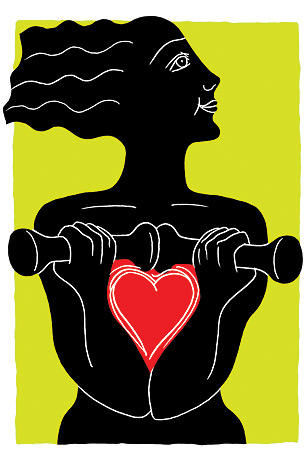
Medical myths die hard, and one of the biggest is that heart disease is a problem mostly for men. That's not even close to being true: according to the American Heart Association (AHA), more women than men die from heart disease in the U.S., and 1 in 3 women is living with it today. Yet despite these striking statistics, most patients and even many physicians still fail to think of heart problems when a woman has the classic symptoms of chest pain and arm or jaw numbness. Trying to reverse this faulty thinking and drive down mortality rates, the AHA has published a brand-new set of guidelines for reducing women's risk of heart disease, heart attack and stroke.
One way to do it is with low-dose aspirin, already a well-known preventive for men. Women of any age who are at high risk for heart disease, says the AHA, should definitely consult their doctors about taking the blood-thinning painkiller daily. Women over 65 should do so regardless of their health history—a reversal of the AHA's earlier guidelines. It gets trickier, though, for the average healthy woman under 65. In that population, aspirin doesn't help in preventing heart attacks, although it can reduce the risk of the nonbleeding types of stroke. (Men, by contrast, generally get little or no stroke-prevention benefit from aspirin.) The trick here is for doctors to figure out on a case-by-case basis when the benefits of stroke reduction outweigh aspirin's risk of triggering bleeding in the stomach and the brain.
What's really noticeable about the new guidelines is how starkly straightforward the AHA is about who's at risk—which is almost every woman. Anyone who has at least one major cardiovascular-disease risk factor (including physical inactivity, poor diet and smoking) falls into that category. That leaves a scant 10% of U.S. women at optimal risk, meaning they have no major risk factors.
"Our biggest message is don't wait until you have a risk factor, because 40% of the time the first symptom of heart disease for a woman is a fatal heart attack," warns preventive cardiologist Dr. Lori Mosca, chair of the expert panel that wrote the updated guidelines.
In addition to new aspirin protocols, the guidelines add an exercise recommendation of 60 to 90 min., preferably daily, for women who are trying to either lose weight or sustain a weight loss. According to the U.S. Department of Health and Human Services, more than 60% of American women are overweight or obese—so again, most women need to comply with this new fitness prescription. For women not battling the bulge, the previous guideline of 30 min. a day stands.
"We still have to answer the question of whether it's feasible to do an hour or 90 minutes of exercise a day," admits Mosca, "but we also need to think about how to incorporate exercise into our everyday lives." Mosca, for instance, says she takes workout clothes to her son's sports events in case she can sneak in a few circuits around the track.
Alongside the list of dos, the guidelines also single out don'ts. Although it can have significant benefits for fetal development, folic acid, recommended just a few years ago, turns out not to help prevent heart disease and should not be used for that purpose. Neither should hormone-replacement therapies or antioxidant supplements such as beta-carotene and vitamins E and C. Omega-3 fatty-acid supplements, on the other hand, are a good thing, says the AHA.
If you're a woman and still not sure whether you should be concerned about heart-disease risks, whip out a tape measure and circle it around your waist. If it reads more than 35 in., chances are that you are at high risk for or already have high blood pressure, diabetes and/or high cholesterol. It's time to talk to your doctor, make some lifestyle changes and get heart healthy. That's one thing men and women also have in common: the basics still work.
Sanjay Gupta's Fit Nation series airs on House Call on CNN, Saturdays and Sundays, at 8:30 a.m. E.T.
—With reporting by Shahreen Abedin